We've independently reviewed this article to make sure it's as accurate as we can make it.
To find out more about our article creation and review process, check out our editorial guidelines.
Does your washing machine keep blowing fuses left, right, and center? You’re not alone! In fact, blown fuses are a common washer problem that causes hundreds of people to struggle every day.
I know having your washing machine fuses blow is very annoying, especially when you have a large pile of dirty laundry in urgent need of cleaning. But luckily, you came to the right place for answers.
Below, you’ll find a list including the 7 most common causes behind a washing machine blowing fuses and easy ways to address each one.
If your washing keeps blowing a fuse, avoid using extension cords, check the power supply, repair the plug wiring, and disconnect other appliances from the circuit. If that fails, try relocating the washer, repairing the door safety lock, or replacing the mains filter.
Keep reading to wash those dirty clothes!
7 Ways to Fix a Washing Machine That Keeps Blowing a Fuse
If your washing machine keeps blowing fuses so often that you wonder whether you will have to fork out for a new one, something has to be done.
My usual advice for when a washing machine is blowing fuses is to look at the issue from every angle, as it can allow you to gain a wider perspective. Here are some of the most efficient solutions you can try:
#1 Avoid Extension Cords
Extension cords are great for many purposes, but often, powering your washing machine isn’t one of them. Using an extension can lead to short circuits and could even be a major fire hazard.
Extension cords are not the only things you want to avoid, as you’ll also want to stay away from multi-contact docks when powering your washing machine.
If moving your appliance from an extension to a proper wall outlet stops the washing machine from blowing fuses, you’re good to go. But if not, that’s ok – there’s still a lot of ground to cover!
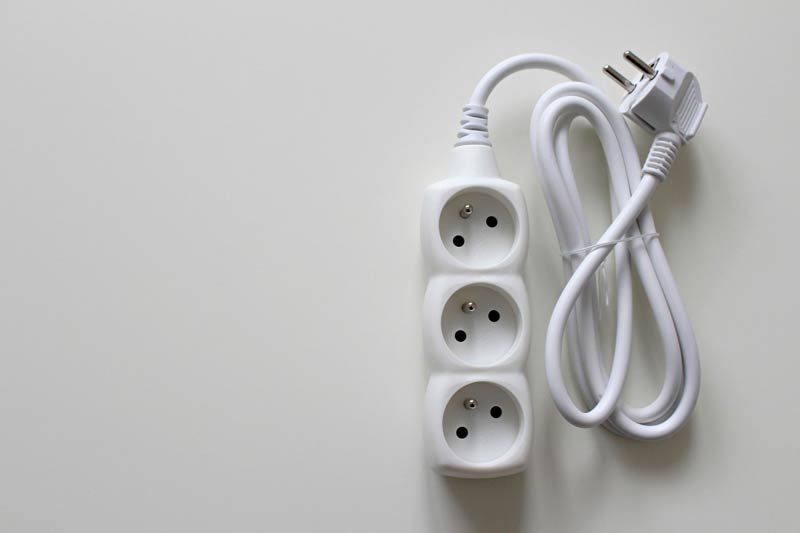
#2 Check the Power Supply
If your washing machine keeps blowing fuses, there could be a problem with your power supply.
To ensure that your power supply is not the root of the problem, please do the following:
- Remove the power cord from the main supply.
- Plug another appliance into the same wall outlet. (Preferably a large consumption appliance such as a hair dryer or a kettle).
- Test the other appliance to see if it works properly. If it doesn’t, you will need to have the power supply checked by an electrician or try plugging your washing machine into a different power socket.
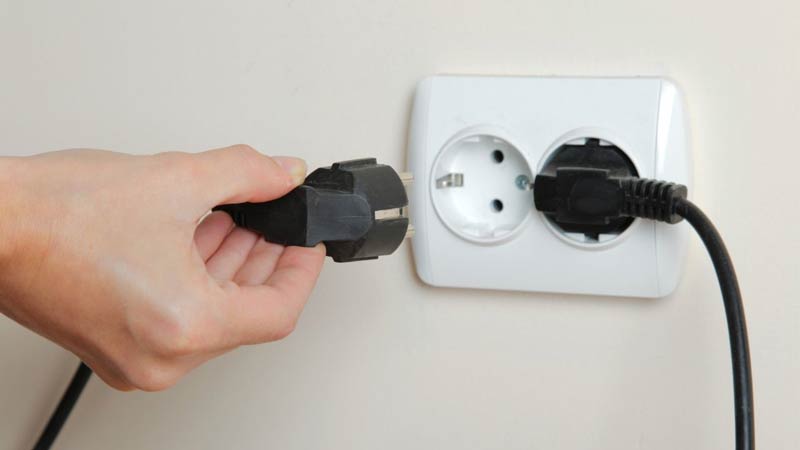
#3 Disconnect Other Appliances From the Circuit
Another possible reason why your washing machine keeps blowing fuses is that you’re overloading the circuit the appliance is connected to. Circuit overloads can happen for many reasons, but one of the most common is having other power-hungry devices connected in the same spot as your washing machine.
Washing machines and tumble dryers are large, energy-thirsty appliances, so if they are both connected to the same circuit and used at the same time, they could make one of the appliances blow a fuse.
But it is not just washing machines and tumble dryers that should not share a circuit. Many household appliances need a lot of energy and cannot share a fuse. So, if your washing machine is sharing a fuse circuit with another large appliance, do this:
- Disconnect the washing machine from the shared fuse circuit.
- Put the washing machine on its own dedicated circuit
- If you don’t see any improvements after moving the washing machine, move on to the next section in this article

#4 Repair the Plug Wiring
Sometimes, repairing your washer’s plug wiring can be the answer to your most burning questions. From what I’ve seen, having the plug wiring on your washing machine fail is not very common, but it can happen. If you suspect bad plug wiring is to blame, make sure to check it by carefully following the steps below:
- Unplug your washing machine from the wall outlet.
- Inspect the plug wiring and cables for any signs of damage. If you see any damage, you will have to replace the cables.
- Check for blown cables and blown plug tops. If you see any, you will have to replace the cables too.
- After you have checked and fixed the wiring, you can test the washing machine again. If the washer continues to blow fuses, move on to the next section in this article.
If you want to get any replacement part – or see how much one would cost – click to enter your model number in the search bar below. Our partners at AppliancePartsPros stock almost every part with free guides on how to install them.

#5 Relocate the Washer to a Warm, Indoor Space
Washing machines are a little fussy and aren’t made to be in cold or overly humid environments. In my experience, when exposed to extreme cold or humidity, washing machines can trip fuses while they run.
Why does humidity cause blown fuses? Mainly because rooms without heating are prone to dampness in the winter. Dampness from the room can seep into the washing machine and affect its components. It is common for dampness to work its way into low-voltage components and even control modules and motors.
To avoid issues, do not install your washing machine in the following places:
- Outdoors
- Conservatories
- Outdoor buildings (such as garages, sheds, or outhouses)
Has your washing machine been exposed to a damp environment for a long time? Then you’ll need to have it checked by an electrician. Damp could have already worked its way into the components of your appliance, in which case, you’ll need to replace them before the washing machine can work properly again.
If you have always maintained your washing machine in a heated, dry room, check out the following tips in this article.
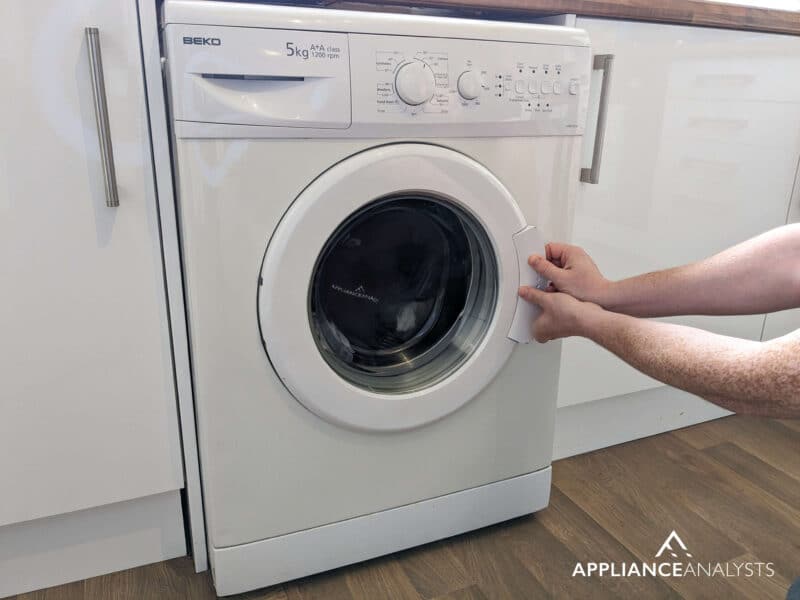
#6 Repair the Door Safety Lock
Most modern washing machines are built with a door safety lock that prevents you from opening the appliance’s door while it is mid-cycle. If your washing machine blows a fuse as soon as the door locks, this could indicate that the door has a fault.
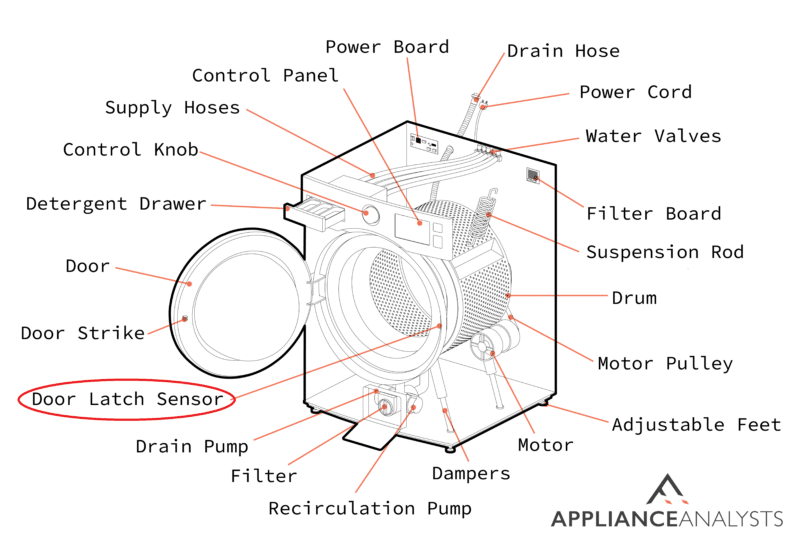
Your washing machine door could have one of the following issues:
- The door lock is arcing internally.
- The door has an electrical fault or an RCB unit trip.
- The interlocking system is making the washing machine trip.
If you suspect your washing machine door is the root of the problem, you must call an electrician.
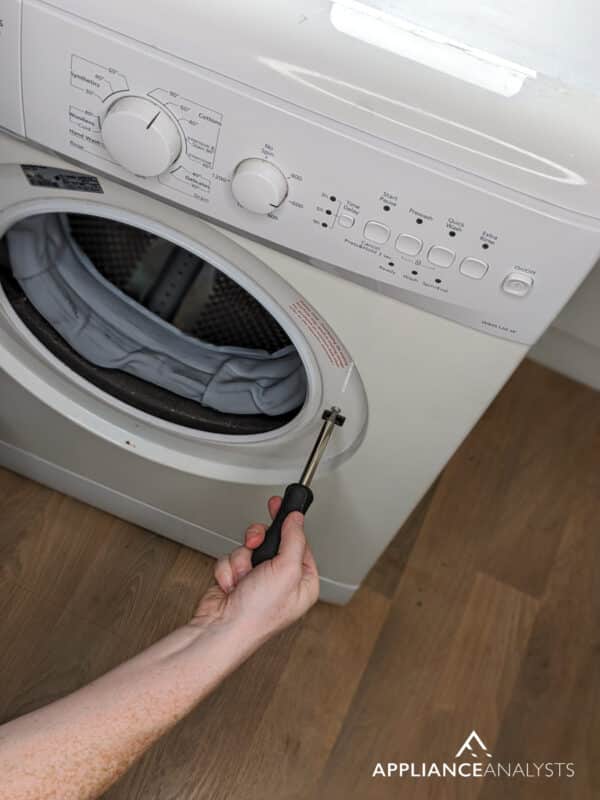
#7 Replace the Mains Filter
Replacing the mains filter (aka interference suppressor) is the last solution I’d like you to try. The mains filter is manufactured to stop your washing machine from affecting other electrical appliances in the circuit.
But how can you know whether a faulty mains filter is why your washing machine keeps blowing fuses? If your interference suppressor is bulging or covered in burn marks or liquid, it could be faulty. You will need to replace the mains filter for the washing machine to work again.
If you want to get any replacement part – or see how much one would cost – click to enter your model number in the search bar below. Our partners at AppliancePartsPros stock almost every part with free guides on how to install them.

Conclusion
When your washing machine keeps blowing fuses, something as simple as doing your laundry can become the day’s challenge.
Luckily, as I hope this article has helped you better understand, more often than not, addressing the most common causes behind washer fuse issues is easy and quick. In many cases, something as simple as not overloading your wall outlet and keeping the washing machine somewhere dry will do the trick.
Thank you very much for sticking with me all the way to the end. If this article proved useful, please check out our other incredible resources below and consider subscribing to our newsletter.
Happy washing!
Craig.







